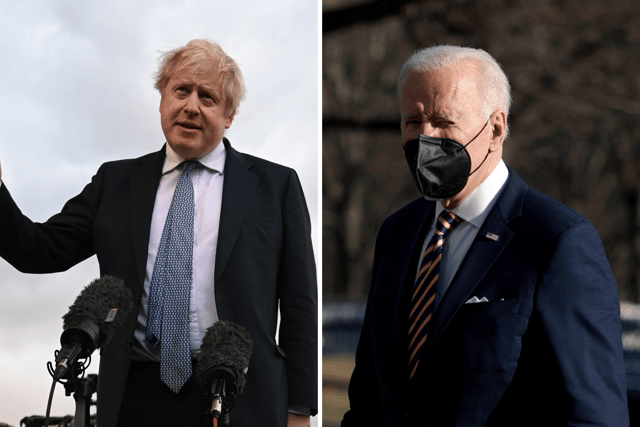Ukraine: what did Boris Johnson and Joe Biden say during their meeting - and can peace with Russia be met?
This article contains affiliate links. We may earn a small commission on items purchased through this article, but that does not affect our editorial judgement.
and live on Freeview channel 276
Prime Minister Boris Johnson and US President Joe Biden have held crunch talks as the threat of invasion and attack grows in Ukraine.
Western states are readying themselves for a Russian attack on the region as the situation between the Eastern nation and its neighbour continues to escalate.
Advertisement
Hide AdAdvertisement
Hide AdThe US warned on Friday (11 February) that a “Russian invasion could happen during the Olympics”, which are currently ongoing in Beijing, with US and UK nationals living in Ukraine urged to leave as soon as possible.
Russia has reiterated that it has no intention of invade Ukraine, however US intelligence has suggested that an invasion could take place as soon as Wednesday (16 February).


What did Boris Johnson and Joe Biden discuss in their meeting?
The two Western leaders spoke over the phone on the evening of Monday 14 February.
In a readout of the call between Mr Johnson and President Biden, the pair spoke about how a “crucial window for diplomacy and for Russia to step back from its threats” remains in the hope that conflict can be avoided.
Advertisement
Hide AdAdvertisement
Hide AdThe pair also placed emphasis on the need for Western nations to reduce their reliance on Russian gas as part of economic sanctions against President Vladimir Putin’s actions.
A Downing Street spokesperson said: The Prime Minister and President Biden updated one another on their recent discussions with fellow world leaders. They agreed there remained a crucial window for diplomacy and for Russia to step back from its threats towards Ukraine.
“The leaders emphasised that any further incursion into Ukraine would result in a protracted crisis for Russia, with far reaching damage for both Russia and the world.
“They agreed that western allies must remain united in the face of Russian threats, including imposing a significant package of sanctions should Russian aggression escalate.”
Advertisement
Hide AdAdvertisement
Hide AdBoth Mr Johnson and President Biden will remain in “close contact” as the situation continues.
A White House spokesperson also confirmed that President Biden and Mr Johnson spoke about moves to reinforce NATO defences and placed emphasis on coordination among allies to impose “severe consequences” if Russia does invade Ukraine.
Will Russia invade Ukraine?
The crisis talk comes after Mr Johnson urged President Putin to step back from the “edge of a precipice” earlier in the day.
US intelligence has suggested that President Putin could invade Ukraine as early as Wednesday.
Advertisement
Hide AdAdvertisement
Hide AdThe Prime Minister said: “The signs, as you’ve heard from President Biden that they’re at least planning for something that could take place as early as in the next 48 hours – that is extremely concerning.”
He also said that “the world needs to learn the lesson of 2014” when when it comes to sanctioning the country, adding: “What I think all European countries need to do now is get Nord Stream out of the bloodstream.”
Why has the US moved its embassy in Ukraine?
The US also confirmed that it will be “temporarily relocating” its embassy, which is currently located in Kyiv.
Advertisement
Hide AdAdvertisement
Hide AdSecretary of State Antony Blinken confirmed that the embassy will move from the capital city to Lviv, in the west of the country.
He said that the moves comes “due to the dramatic acceleration in the buildup of Russian forces”.
Mr Blinken said: “We are basing our assessment on what we are seeing on the ground with our own eyes, which is a continued and unprovoked Russian buildup on the border of Ukraine and no accompanying evidence of de-escalation.”
There are fears that if an invasion were to take place, Russian forces would attempt to take Kyiv.
Advertisement
Hide AdAdvertisement
Hide AdMr Blinken added that Lviv “affords it a degree of protection that other places in Ukraine may not have”.
A message from the editor:
Thank you for reading. NationalWorld is a new national news brand, produced by a team of journalists, editors, video producers and designers who live and work across the UK. Find out more about who’s who in the team, and our editorial values. We want to start a community among our readers, so please follow us on Facebook, Twitter and Instagram, and keep the conversation going. You can also sign up to our email newsletters and get a curated selection of our best reads to your inbox every day.
Comment Guidelines
National World encourages reader discussion on our stories. User feedback, insights and back-and-forth exchanges add a rich layer of context to reporting. Please review our Community Guidelines before commenting.
